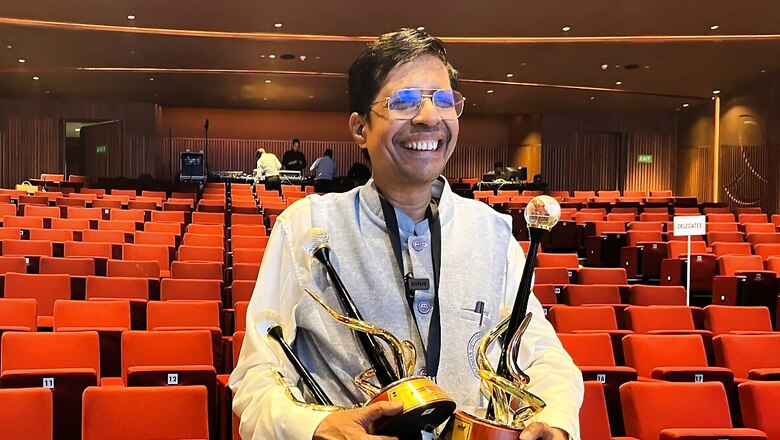
views
Indian Institute of Technology (IIT-Madras) was rated the top-most higher education institution overall for the sixth consecutive year in the National Institutional Ranking Framework (NIRF) 2024 released by the Ministry of Education (MoE). The institute has been ranked on top in the ‘engineering’ category for the ninth year in a row. It stood second in the ‘research’ and ‘innovation’ categories.
IIT- Madras director Prof V Kamakoti, who was in the national capital to attend the event, spoke to News18, on what makes the institute stick to the top every year, what it is that it strives to improve upon next, why it wants to beat IISc in the rankings, a positive trend in core jobs and why AI will create more jobs in the future.
Here are edited excerpts from the interview:
Q: What is it that makes IIT-Madras tick all the boxes, all the time?
Prof V Kamakoti: So it’s only a cohesive, very focused effort of all the faculty, students, different ministries, the ministry of education, industry and alumni, so many people are involved in it — if you look at every parameter, there’s contribution from each one of them. So this focus that we have is what helps us tick all the boxes. Also, we have a strategic plan that focuses on pointed areas.
Q: What is the next challenge for you? What is it that you are striving to improve upon?
Prof V Kamakoti: In the ‘innovation’ category in the rankings, we have been number two consecutively from last year. We have to find out why we are number two. Innovation is based on many things – how many companies are there, how many alumni etc. IIT-Bombay is doing extremely good in it, they are number one this year. We have to find out where we stand. We follow the best practices of the best institutions, take inspiration from them and try to improve, this has been good about the rankings. So, for example, we are trying to beat IISc, Bengaluru in research, it’s very difficult, because their focus is on post-graduation, the teaching load is less, we have undergraduate programmes so our teaching load is high. So, there’s a healthy competition.
Q: Are International rankings a priority since India has consistently not been able to make in the top 100 global university rankings?
Prof V Kamakoti: Yes, international rankings are a priority, which means we will like to improve, but we are not going to chase behind that rank, because if I do that then I may have to drop certain things that are national priority. There are online courses to be launched, inclusive education, there’s much to do. International rankings have certain parameters that are internationally relevant, on which they are ranking everyone. There are a lot of things we need to do with respect to our nation because we are a population of 1.4 billion. Lot of priorities that we have are captured by the NIRF. We will be sticking to this, because this is relevant to us, we want to be relevant. Not just the demographics are different, the expectation is different, what an IIT is supposed to do for India is captured by NIRF.
Q: Where do we stand in terms of research internationally? While India’s research output has grown, concerns on quality persist.
Prof V Kamakoti: We are not lacking. The first 3D printed rocket was from a startup incubated at IIT-Madras, nobody else has it. There are different aspects — the number of citations, the next is translational research, which means how much of what we do is relevant to the society. Over the last 2-3 years we have been doing a lot of translations at IIT-Madras. Then it’s one thing to have a citation, but instead of just publishing a paper, I can develop a patent out of it and commercialise it. Research can actually be dedicated to developing more patents.
Q: Last year you had said that students not opting for core branches is a “grave” concern. Has there been any change in the scenario since?
Prof V Kamakoti: This is now improving. We are seeing a lot of entrepreneurs coming in as we have started our startup-100 programme to give it a boost. So, we are basically telling students that prosperity will come once you go out loving the job that you do. That is catching up now. We will see more of core jobs, more people sticking to that discipline rather than jumping over to some other discipline. I’m seeing a positive trend through these startups. As a director, I feel a change in where the wind is blowing.
Q: The impact of automation is being reflected in a change in the demand of profiles by companies over the past year. Is AI going to impact jobs?
Prof V Kamakoti: When computerisation was used in banks for the first time, there was a strike called by the bank unions, as they feared all employees, especially cashiers will have to go and only computers will do the work, but today the number of people employed in banks has only risen. The job was automated by cash counting machines, so today a cashier is confident that the counting is correct and at the same time they are now doing something much more constructive. So what is AI going to do, AI is another super-automation that is going to come, which will only improve the quality of the job that a human does. All the mundane jobs will be done by AI and all the interpretation and inference that has to come out will be done by humans. Beyond some point a large system cannot be done by AI, it will do some searching, sorting only. AI is hyper-automation, which means automation of automation, a lot of jobs will be created by this. So, people have to upskill, re-skill, but there will be enough jobs and more interesting than the mundane ones. In engineering, there’s only one thing that’s constant, that is change, always moving to the better.




















Comments
0 comment